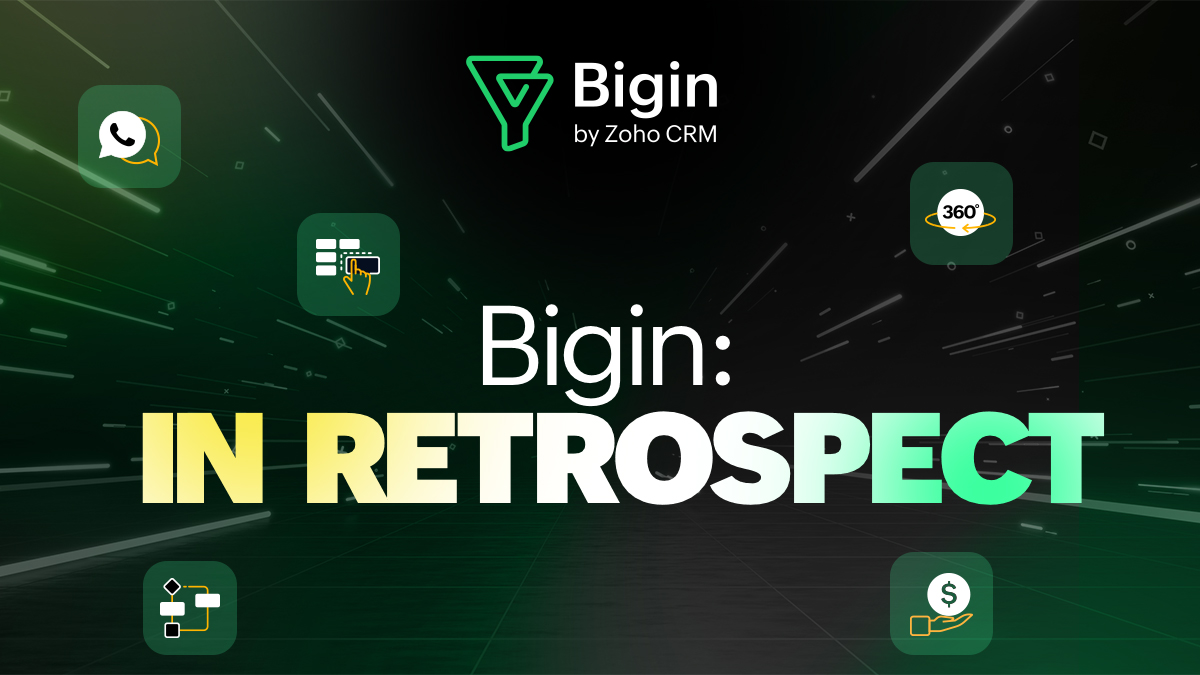Getting started with Bigin? Here are some of the terms that you need to know!
- Published : May 17, 2023
- Last Updated : August 8, 2023
- 626 Views
- 5 Min Read

Beginnings are a crucial time for small businesses. When you're starting up your business, there's so much you have to do, and sometimes it can be overwhelming to handle both customer relations and other business operations at the same time.
Small business owners might be under the impression that only giant companies use CRMs to manage their day-to-day activities, and perhaps that small businesses don't need CRMs. Let's dismiss that misconception right now.
No matter how small or big your business is, a CRM will help you function more efficiently. As your business grows, spreadsheets can become a nightmare to deal with, and you'll need an application that can do more than just store data.
A CRM is a customer relationship management software application that helps you grow your business by maintaining solid relationships with your customers. You need an affordable, easy-to-use CRM with smart features—and that's exactly what Bigin is.
When you are new to using a CRM, you may encounter numerous terms that could appear unfamiliar or technical. But worry not! Below is a quick guide to some common CRM terminologies, and key terms in Bigin to help you begin!
Key terms in Bigin
Pipelines: Pipelines provide a comprehensive view of the deals you've added in Bigin. You can effortlessly drag and drop your deals to different customizable stages as each one progresses.
Pipeline view: With Bigin's pipeline view, you'll have a full overview of every stage a deal goes through in your sales process.
Team pipelines: You can create distinct pipelines for different teams in your organization. For example, one for sales, one for service, and one for marketing—to streamline not just one business process, but all of them.
Sub-pipelines: Easily create sub-pipelines for each of your main pipelines. For example, your sales pipeline could have sub-pipelines for international sales and domestic sales.
Modules: Bigin features multiple functional modules, including Contacts, Companies, Deals, Products, Activities, and Dashboards.
Record: The entries in any module are known as records.
Fields: Create custom pipeline fields and module fields for every module in Bigin.
Tags: Tags are unique identifiers you can use to distinguish records using different colors.
Activities: Any action that you perform in your business is an activity. All tasks, events, and calls with your customers are grouped as activities.
Timeline: The timeline feature enables you to view the history of all changes that have been made to a deal in chronological order.
Audit log: Audit logs display all of the actions that have been performed in chronological order.
Workflows: Workflows help you automate daily repetitive tasks. For example, you can automatically send a welcome email every time you add a new customer to your CRM.
Dashboards: Dashboards feature different types of charts to help you better understand and analyze your business performance.
Signals: Signals are real-time notifications that alert you whenever a customer mentions you, replies to you, sends you a direct message, or when you miss a call.
Toppings: Toppings are functional add-ons that can enhance your experience with Bigin. You can choose from hundreds of third-party toppings from Bigin's marketplace, or even build your own.
Leads and contacts: Bigin lacks a dedicated leads management module, but you can enhance lead filtration and management within the Contacts module by employing different strategies. Click here to know more.
Developer platform: If you're a developer keen on creating your own tools, you can use Bigin's developer platform to create useful toppings that you can keep to yourself or share with other businesses through the marketplace.
Here are some of the common CRM terms:
Lead: A lead is someone who has the potential to become your customer but isn't one yet. The term "lead" is used to refer to such individuals.
Sales process: In CRM, the sales process typically involves the following stages:
- Lead generation: In this stage, the company identifies potential customers who have shown interest in their products or services, and captures their contact information for follow-up.
- Lead qualification: In this stage, the company assesses the potential of the leads and decides whether they meet certain criteria, such as budget, need, and authority, to become viable prospects.
- Sales pitch: In this stage, the company reaches out to qualified leads and provides them with a sales pitch that highlights the benefits of their products or services, and how they can solve customers' pain points.
- Proposal and negotiation: In this stage, the company works with the prospect to develop a proposal that addresses their specific needs and budget. The negotiation process may involve discussions on pricing, contract terms, and other related aspects.
- Closing the deal: In this stage, the company finalizes the agreement with the prospect and completes the transaction, which may involve signing a contract or issuing an invoice.
- Post-sales follow-up: In this stage, the company maintains a relationship with the customer, providing ongoing support and services, and working to foster a long-term relationship that can lead to repeat business and referrals.
Lead management: Lead management in CRM refers to the process of capturing, tracking, and nurturing leads through various stages of the sales cycle.
Sales pipeline: A visual depiction of your sales cycle is a sales or CRM pipeline, which assists in the logical organization of your prospects and the estimation of revenue based on previous behavior such as the conversion rate, average duration of the sales cycle, average contract value, and other related factors.
API: An API is a tool that allows different software applications to communicate and share data with each other, making it easier to build software that can integrate with other systems and services.
Cloud/web-based: A cloud or web-based CRM is software that businesses can access over the internet through a web browser. It helps manage customer interactions by storing data, tracking sales activities, and automating marketing processes. Cloud-based CRM systems are advantageous because they provide easy scalability, lower upfront costs, and greater flexibility.
Contact management: Contact management refers to the practice of collecting and monitoring information on leads and customers. It's an essential aspect of managing business relationships.
Custom fields: Custom fields in CRM are specific data points added to a CRM system that is unique to a business's needs.
Data protection: CRM software is expected to safeguard the customer's data and other user-generated content stored within it. This may include any additional personal information about the customer, including their contact details.
GDPR and HIPAA compliance: To comply with GDPR and HIPAA, CRM software needs to safeguard the personal data it collects, stores, and processes. The software must have security measures to prevent data misuse yet still allow users to manage their data, while the provider must offer documentation and policies that demonstrate compliance with these regulations.
Trust us—running your business with Bigin isn't as complicated as you might think. Bigin can remove the day-to-day bottlenecks you face and make complicated tasks easy—and its affordability is just an added bonus!
All it takes is 30 minutes to set up your account!
Bigin has everything your small business needs to step up to the next level!
So what are you waiting for?
|Access Bigin|


